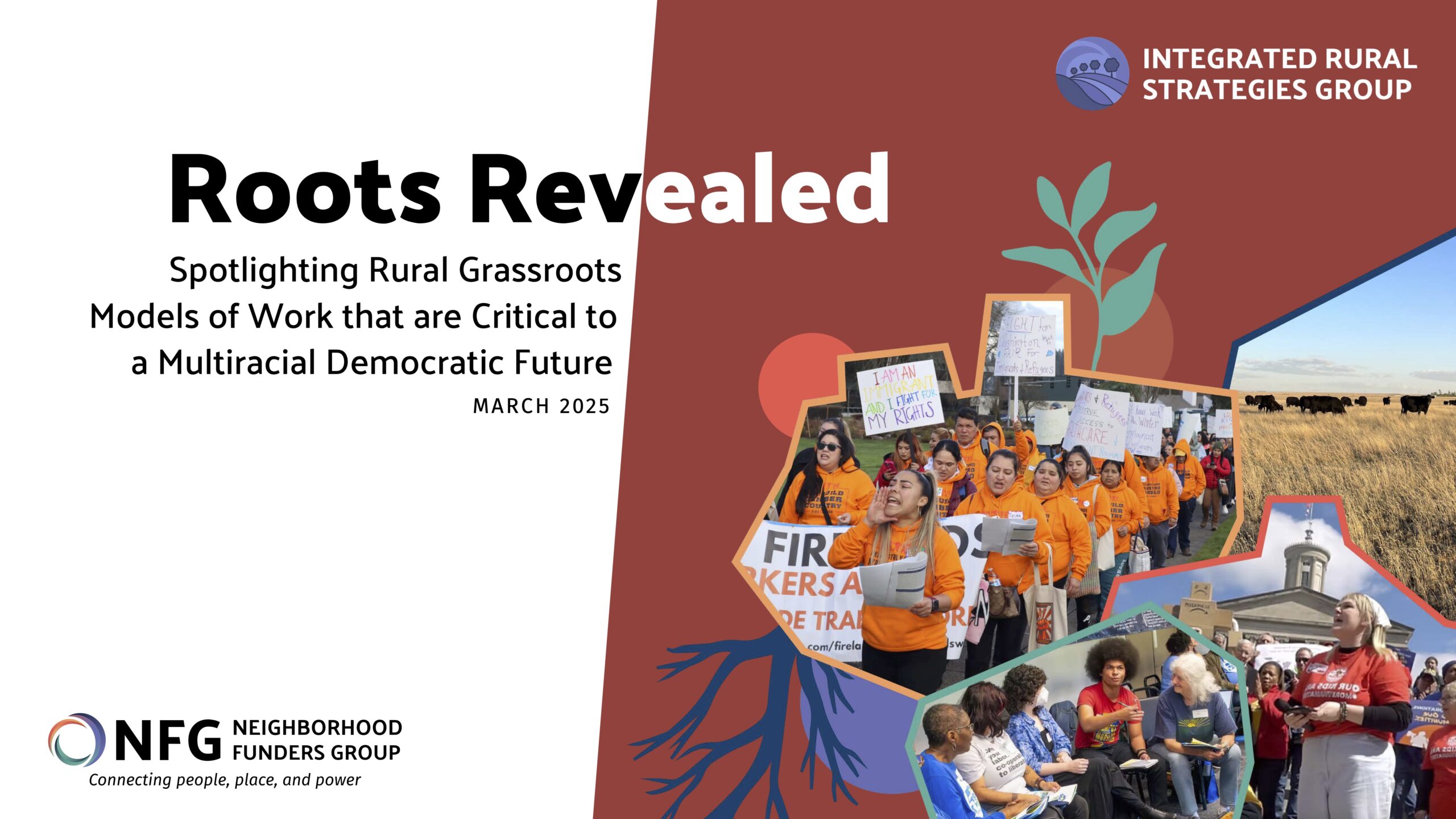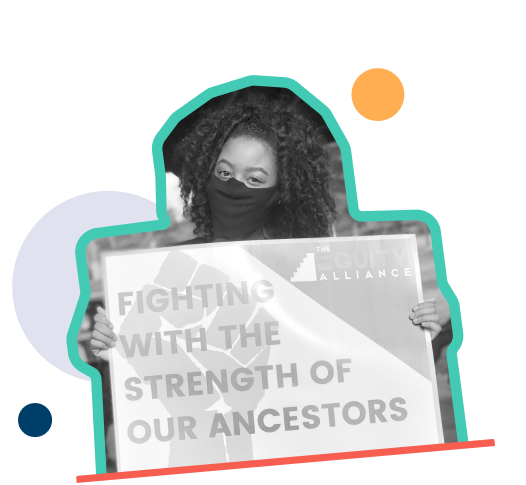Dear friend,
I was born and raised in Southwestern Montana, in a town that at the time had a population of just over 20,000. The community was homogenous and despite the powerful paradigms it imposed on my young mind, I somehow felt drawn to experiencing different societal structures. This inkling, in part, led me to stack up as much financial aid as possible and head to college in New York City. I was very unclear about what ways of life and opportunities to affect positive change existed outside of the context I grew up in, but I went to seek them out.
It feels a bit ironic now—and quite telling—that the path that led me to law school, policy work, and international human rights, ultimately looped back on itself, finding me back in my (now much busier!) hometown in Montana, working to build the ecosystem of rural community organizing as the Director of NFG’s Integrated Rural Strategies Group (IRSG).
IRSG was founded nearly eight years ago, in the aftermath of the 2016 elections. At that time, a set of NFG members self-organized to reflect on and explore corrective action around their relationship to rural communities. Several years into my career, leading this body of work at NFG is providing me a powerful vehicle in which to align my personal experiences with my small ‘p’ political values, and to bring philanthropy along so that frontline BIPOC and low-income rural communities can be resourced to hold the power to inform and influence the conditions of their lives, with change they can materially see.
IRSG’s Rural Equity Summit is our annual flagship event to build a network of funders to deepen and advance their individual and collective rural grantmaking strategies. Whether you’re a funder with a long track record of supporting rural communities, or are just know working to understand how to responsibly and impactfully fund rural communities, we welcome you to join our upcoming 2025 Rural Equity Summit March 4th and 5th.
For the past four years, IRSG’s Rural Equity Summit has served as an introduction to the program, demonstrating what rural organizing & power building looks like and how to resource it. The work to coordinate, move resources to hyperlocal work, and support rural communities’ defense and safety are paramount in this moment where the federal political climate is largely antithetical to our vision of a multiracial democracy where rural communities contribute to and benefit from climate and land justice, economic justice, racial justice, and Indigenous justice and sovereignty.

This year, our Summit will remain a space for the longer-term analysis building that our past Summits have offered and - most importantly - will also lead with urgent and actionable learnings and opportunities to get resources to the ground. As one rural community partner put it to me in conversation just today, “we don't have the luxury of dancing around the messaging that will get funders to resource us before we crumble.”
The 2025 Rural Equity Summit will have a greater focus on the coordination it will take to fund rural BIPOC and low-income communities. During this virtual convening over two afternoons, funders will get aligned on the “whys” and “hows” of making grants to rural organizing, and co-create shared strategies with their peers in the sector and movement leaders. In short, we want to build a community of grantmakers that are interested in working collaboratively to resource rural!
Attendees will have the opportunity to engage in community and funder-led dialogues, concurrent mini-sessions, and deep dive breakout groups that focus on the following topics:
-
IRSG’s New York Rural Organizing Portfolio: Following IRSG’s 2021 report, Resourcing Rural Organizing Infrastructure: A New York Case Study, IRSG partnered with a design committee of funders and rural community leaders from New York State to translate our report’s findings and recommendations into an actionable and strategic funding portfolio. After officially launching in 2024, the portfolio has unlocked nearly $200,000 of committed funds and counting to support 12 organizations who are working in rural communities on issues around health (mental, maternal, etc.) equity, criminal justice, food systems, worker justice, and more.
-
Immigration safety & defense: We are witnessing the horrifyingly swift incarceration and deportation of Latine and Caribbean immigrants across the US and Puerto Rico. Rural communities have not been spared from violent ICE raids. At the Summit, we will break down “urban” and “rural” funding silos and explore the ways rural immigrants and migrants are particularly vulnerable due to their congregate workplace settings and their need to navigate dispersed geographies to access school, jobs, healthcare, and other daily elements of a dignified life.
-
Connecting election day to the everyday: Democracy doesn’t just happen once every four years, it is a constant practice and enduring work. Even before the 2024 presidential election, we knew philanthropy would have to divest from its usual boom/bust election-cycle model — rapidly infusing resources to election cycle community engagement, and just as abruptly withdrawing after the dust settles and the grant cycles expire. Toward an alternative paradigm, I’m so proud that IRSG is set to release a new report, “Roots Revealed,” as a guide and call to philanthropy to directly and meaningfully support grassroots rural power building work. Stay tuned for the official launch + registration for a funder briefing on the report!

-
Leveraging the power of local news: Local news has the power to combat mis/disinformation, foster informed civic engagement, and build toward a multiracial democracy. But traditional newsroms and the commercial models they’ve been developed from, have been failing to meet audiences’ needs, especially those of BIPOC, low-income, and rural people. In order to transition journalism as we know it to a public good that is informed by trusted community voices, we will explore the ways in which existing and emergent news/information ecosystems can play a role in building rural community power to advance justice.
-
Indigenous and tribal rights, sovereignty: US state and federal governments have made persistent attempts to erode the self-determination of Indigenous peoples through disinvestment and targeting tribal rights. Philanthropy compounds this chronic underinvestment by consistently overlooking Native communities as part of their grantmaking. Research by our partners at Native Americans in Philanthropy (NAP) found that between 2002-2016 large foundations only granted .4% of total funding to Native American communities and causes. Preserving tribal sovereignty is integral to protecting the health + safety, land, and cultural integrity of Indigenous peoples, particularly those that live in rural areas. As my teammate Stephan, IRSG’s Senior Program Coordinator, puts it “Native communities are not a footnote in rural organizing; they are central to it.”
-
Decarceration as community investment: Local officials and corporate elites consistently argue that carceral expansion will drive economic growth in rural communities. This is a myth. Instead, critical resources are siphoned away from education, housing, infrastructure, while prisons become sites of human and environmental harm, and the promise of new and quality job opportunities for local residents is rarely fulfilled.
Reflecting on the origins of IRSG, at the beginning of another Trump admin, there is a sense of déjà vu, but I’m also struck by how far IRSG has come since 2017. In the last eight years, we’ve partnered with and activated funders to commence and deepen their investments in building capacity for rural communities to organize, self-determine, and contribute to progressive change in their towns, counties, states — and yes, even nationally. IRSG is ready for this moment. And we’re ready to bring even more people into the fold while organizing for deeper coordination.
Not only is this message an invitation to register and attend the Summit, it’s also an invitation to reach out to me to share how IRSG can continue evolving as a space for connection and support that is catalytic to your work. Hearing your needs, interests, ways of moving resources, etc. will only make us stronger in the years to come. I encourage you to reach out to me or schedule some time to chat through my Calendly.
It is time for swift, impactful, and coordinated action on philanthropy’s part, and in particular for and alongside local rural frontline communities. I’m honored to offer IRSG as a space to learn about and commit to doing so. I look forward to seeing you at IRSG programming very soon.
In solidarity,
Lindsay

